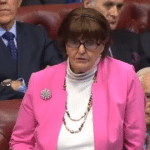Help our local partners realise their vision of hope for their communities

Question: My Lords, I too warmly congratulate the noble Lord, Lord Addington, on this very timely debate. I declare an interest as founder and CEO of the Humanitarian Aid Relief Trust, working with partners abroad. I greatly appreciate the contributions, including that of the noble Baroness, Lady Anelay, which have highlighted the issues being faced there. Today, however, I shall focus on the problems in this country.
As your Lordships know, the Chancellor of the Exchequer has announced a fund totalling £750 million to assist the charity sector, including match funding for the “Big Night In” appeal, broadcast by the BBC last week. Although warmly welcomed, and a testimony to the generosity of the British people, that money falls far short of the funding needed.
A survey by the Directory of Social Change found that half the charities surveyed were already in financial difficulties due to the pandemic, with another 42% expecting to face difficulties. The UK charity sector has stated that it faces a shortfall in its total income of £4 billion due to the pandemic. Will the Minister tell us what the Government will do, beyond the £750 million package already announced, to ensure that critical services supplied by charities will survive the crisis? Also, which areas will be prioritised as the pandemic continues and what criteria will be used to select them? What processes are in place to ensure that this funding supports services for the most vulnerable, and that equalities considerations are fully woven into the design and delivery of the schemes?
I turn briefly to the £370 million to be distributed by the National Lottery Community Fund. What will be the definition of “small charity”? What will the eligibility criteria be? When might charities begin to bid for that much-needed funding?
The most important challenge for civil society is not the preservation of any individual charity itself but the vital support provided by charities for the communities that they serve—support not otherwise available. Therefore, the financial deficits will have serious effects for many of the most vulnerable people in our country today.